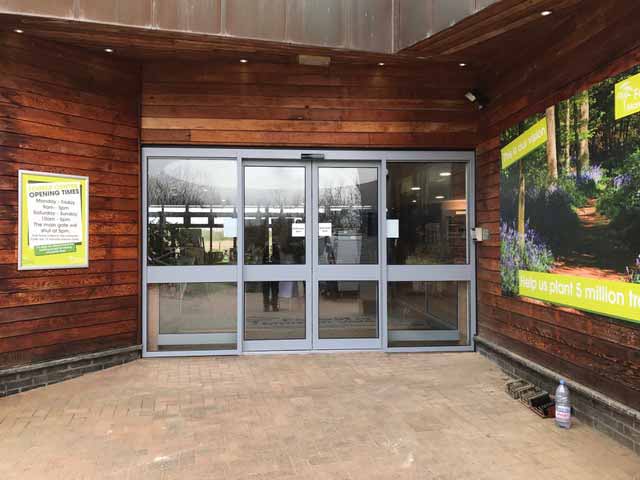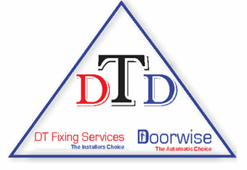The majority of retail and industrial premises tend to opt for automatic sliding or swing doors, while automatic revolving doors tend to be favoured by hotels and commercial establishments. Different types of automatic doors carry their own risks which need to be assessed individually.

Your Responsibilities to Maintain Automatic Doors
Posted onAre you gambling with your customers’ safety?
There is no doubt automatic doors on business premises can enhance a customer’s or employee’s experience. The elderly, parents with pushchairs and the disabled find accessing and leaving buildings with automatically opening doors that much easier. Anyone carrying items can enter or exit the premises with minimal fuss. What’s not to like? Automatic doors are a piece of machinery. Just like a circular saw, heavy press, or any other type of machinery, if they are not serviced or maintained properly, they can be lethal, especially if the very young or very old are involved.
Checks You Can Complete
As the owner of the business, you become the ‘responsible person’ and have a duty of care to ensure the health and safety of employees, customers, and clients who enter your premises. This also includes the safe operation of any automatic swing, sliding, or revolving doors. Automatic sliding doors require high-level weekly checks that can be carried out by either yourself or your building’s caretaker in accordance with BS 7036.
Servicing Requirements
It is recommended that servicing be undertaken as a minimum every six months, in accordance with the Workplace (Health and Safety and Welfare) Regulations 1992, and only by fully qualified specialist engineers. Although 6 monthly maintenance periods are a recommendation, it is advisable to discuss your individual circumstances with our team as we can make additional personalised recommendations that may be more suitable for you. We can undertake a full risk assessment survey to determine whether more frequent visits are required to ensure the upkeep of your doors. We offer both reactive and planned maintenance programmes.
Nothing mechanical or electrical is infallible. To minimise the risk of complete failure, our planned maintenance options provide you with the opportunity to replace any parts which are beginning to show signs of wear.
We offer a comprehensive range of maintenance packages and will endeavour to carry out all work at a time that minimises any business disruption. For more in-depth information on the most cost-effective way to keep your automatic doors opening and closing safely, please call 01234854690.
Tips to Maintain Your Automatic Doors
Lubricating Automatic Doors
Before addressing any potential door squeaking, ensure that there are no broken parts. Check the friction systems such as hinges, locks, and latches to prevent noise and wear issues. These are the primary areas where the motor and the door rotate, and they require attention when applying grease.
Depending on the type of automatic door, whether it’s sectional, revolving, sliding, or swinging, the components vary. If you’re unsure, our installation team can assist you and clarify any doubts.
Additionally, don’t forget to lubricate the arms, chains, counterweights, and zippers of the doors, if applicable. Properly greased and non-drying points will ensure smoother operation of your automatic door. We recommend using grease or a thin layer of petroleum jelly as door lubricants, with the latter being more durable, lightweight, and resistant to hardening.
Preventing Water Damage to Seals and Channels
Rain or humidity can often damage the control panels of automatic doors. If the control panel is wall-mounted, take care to prevent water from entering through screw holes or cable entries. Applying silicone to seal these spaces would be a wise solution if water does manage to get inside.
Beware of Insects
If water can enter the control box, it’s also possible for insects and small animals to find their way in. The heat generated by the current transformer attracts them, particularly in the case of automatic sliding door motors located at ground level. It becomes even worse if the cable entry has been left exposed.
Seal the entrance or place mouse poison in the area near the motor, but exercise caution if there are children or pets nearby. Be mindful of cockroaches and ants!
Regularly Monitor the Electrical Panel of the Door
While the motor is running, observe if any relays are scorched due to their frequent use. Avoid touching them as they may be hot.
If you have knowledge of electronics, you can also inspect other door components for damage and consider requesting a replacement or contacting a repair service to prevent further breakdowns.
In any case, Auto Door offers excellent repair services and spare parts for automatic sectional, swing, revolving, or sliding doors. You can reach out to us for replacements or repairs of components that have been more significantly affected over time.
Clean the Surrounding Areas of the Automatic Door
Depending on the type of automatic door installed in your home or business, garbage and dust can accumulate to varying degrees. For sliding doors, it’s crucial to keep the floor guides clean to prevent jams or derailment, which can be highly dangerous.
For swing doors, garbage can accumulate around the hinges, affecting proper door closure depending on the type of hinge and its installation.
Swinging doors, as well as any others with side guides previously greased, may accumulate substantial dust over time, causing slow and stiff movement. We recommend removing the grease and using liquid lubricants specifically designed for overhead doors.
Grease the Doors Every Two Months
Regularly greasing the doors is a recommended practice to significantly reduce breakdowns. In these cases, using consistent grease may not be effective as it can cause jams over time. Instead, spray grease, available at hardware stores, works well.
Apply grease to the points that facilitate the turning of the motor and the door in sliding doors. However, avoid disassembling the motor or applying excessive grease to the interior, as they are already greased during manufacturing to prevent dirt accumulation.
Check the Condition of Door Springs
Over time, springs can rust and lose their strength as they expand to close the door and compress when it opens. To prevent spring breakage, apply oil and verify that the springs have not lost tension and can be readjusted if necessary.
Inspect Door Panels for Damage
For sectional and automatic doors, check the panels for any surface dents. If a panel needs replacement, it is not necessary to change the entire door. Instead, contact professionals experienced in working with all types of doors. This maintenance task is not expensive but is best to address to avoid future problems.
Automatic Door Controls
Due to continuous usage, the controls for automatic doors may occasionally malfunction, just like many other devices. If you encounter any issues, seek assistance from a professional service provider.
Our Domestic Services
Windows → Doors → Conservatories → Fascias & Soffits →Our Commercial Services
Doors → Shop Fronts → Shutters → Maintenance & Repairs →